

|
 |
Cuckoo Waltz (The): Series One (TV)
R2 - United Kingdom - Network Review written by and copyright: Paul Lewis (4th May 2009). |
|
The Show
 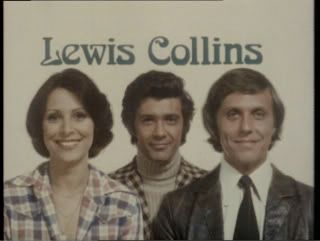 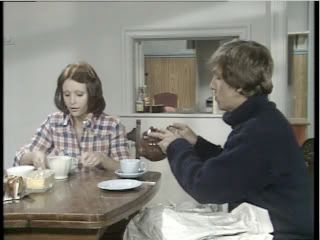 In the situation comedy The Cuckoo Waltz (Granada, 1975-80), David Roper and Diane Keen play a newly-married couple, young reporter Chris Hawthorne and his wife Felicity (or ‘Fliss’); Chris and Felicity live a modest life in a barely-furnished terraced house, with their newborn twins Simon and Sarah. When Chris’ friend Gavin Rumsey (Lewis Collins, pre-The Professionals; LWT/Mark 1, 1977-83) leaves his wife, Carol (Rachel Davies), and finds himself without a place to stay, Chris and Felicity allow Gavin to use their spare room. Soon, Chris and Felicity find themselves having to take care of Gavin, who becomes the proverbial cuckoo in their family nest. Meanwhile, they must also negotiate comic situations involving Felicity’s mother Connie Wagstaffe (Clare Kelley) and their neighbour Austen Tweedale (John McKelvey). Created by Geoffrey Lancashire, an alumnus of Coronation Street (Granada, 1960- ) and the writer of the second series of the much-loved sitcom The Lovers (Granada, 1970-1), The Cuckoo Waltz follows a similar ‘three in the nest’ formula to a number of other British sitcoms, including Whatever Happened to the Likely Lads? (BBC, 1973-4) and flat-sharing situation comedies such as Man About the House (Thames, 1973-6) and the later Game On (BBC, 1995-8). Like these other series, The Cuckoo Waltz revolves around the classic ‘odd couple’ dynamic that is the basis for many situation comedies, with Gavin’s carefree bachelor lifestyle, driven by materialism, placed in juxtaposition with Chris and Felicity’s family-oriented lifestyle, characterised by poverty. Gavin drives a De Tomaso Pantera (with the registration 'GAV1N')*, for which (by episode four) he has ‘just bought an eight-track stereo player […] Cash job, sixty-five quid’, and he engages in many different short-term relationships with his office temps; in contrast, Felicity and Chris live modestly, in a house with wallpaper peeling from the walls, and can only afford to furnish their living room with hand-me-down deckchairs. 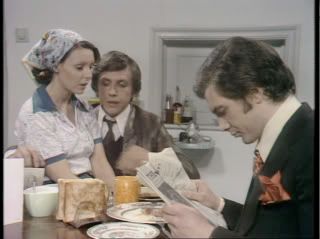 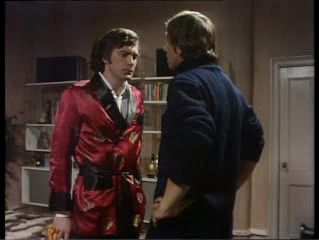 Chris and Felicity acknowledge their situation and strive through their lack of material things: at one point in the first episode (‘Cuckoo in the Nest’), Connie suggests that Chris and Felicity should aspire to owning wall-to-wall carpeting, and Chris jokes that ‘Well, we’ve got wall-to-wall floorboards. That’s a start’. However, the couple also dream of better things, and in ‘Fleet Street’ (episode six) they take a trip to London, where they discover the reality of things, realising that the cost of living is far more expensive than back home in Manchester: whilst paying for a ‘pint and half of bitter’ Chris tells the barman to ‘keep the change’, but the barman comments that ‘I’d rather you pay for the drinks, squire’. Chris and Felicity’s dedication to one another is charming, and the two characters are well-drawn and sympathetic. However, many viewers’ sympathies may predominantly lie with Gavin, due to the occasionally overly-sentimentalised representation of Chris and Felicity’s relationship: Chris and Felicity’s repeated greeting of ‘Chris… Fliss… Kiss’ is initially cute but rapidly becomes maddeningly twee. However, on the other hand the character of Gavin is infantilised through his recurring obsession with his Scalextric set (introduced in episode one: ‘That’s another thing Carol wouldn’t try to understand’, Gavin tells Chris and Felicity), which it is suggested was responsible for the breakup of his marriage to Carol (in episode seven, ‘House for Sale’). 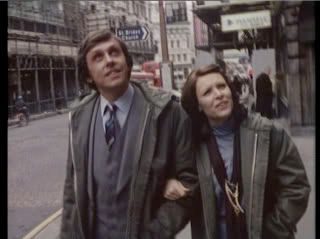 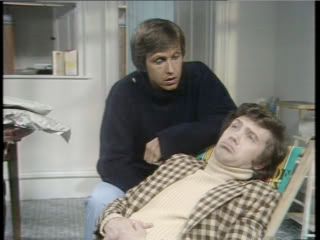 Where most sitcoms end with a joke (in effect, a punchline), several episodes of The Cuckoo Waltz end on a curiously flat note, as if the writers are unsure how to wrap up the different narrative strands: for example, ‘Fleet Street’ ends very abruptly, with Chris and Felicity’s London visit cut short and, once the Hawthornes return home to Manchester, barely reflected upon. There is also a subtly chauvinistic subtext that runs throughout the series: whilst it is revealed that Felicity has three A Levels (in episode six), she is curiously content to accept a very traditional family role and most episodes find her submitting to Chris’ will. Furthermore, in ‘One Week Later’ (episode two), when Felicity tells Gavin that ‘Faint heart never won fair maiden’, Gavin asserts that ‘You don’t win chicks like Carol: they get knocked down to the highest bidder’. However, this isn’t an overriding element of the series; but even alongside other 1970s sitcoms such as Man About the House or The Liver Birds (BBC, 1969-96), or even the characterisation of the strong-minded Thelma (Brigit Forsyth) in Whatever Happened to the Likely Lads?, Felicity’s passive family role seems oddly anachronistic. 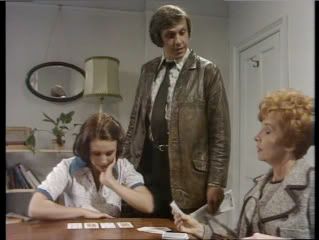 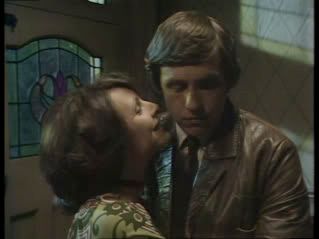 Episode Breakdown: 1. ’Cuckoo in the Nest’ Newlyweds Chris and Felicity live in a modestly-furnished house. Sitting on the deckchairs that furnish their living room, Felicity finds herself harassed by her materialistic mother Connie Wagstaffe: ‘Most people have little money. Most people spend their money on unconventional things like three-piece suites’. When Gavin Rumsey turns up on their doorstep, his head in his hands, it is revealed that his wife Carol has left him. Chris and Felicity offer him a place to stay ‘for a few days, while I pick up the pieces’. 2. ’One Week Later’ A week after Gavin’s arrival, Felicity is aware that he is a drain on the family’s resources. She conspires with Chris and tries to persuade her husband to get rid of Gavin. However, the couple soon change their mind when they discover that Gavin has a top-of-the-range colour television set. 3. ’Paying Your Way’ Struggling to make ends meet (‘Even Jesus has more to start with than one fishfinger’, Connie reminds them), Chris and Felicity try to find a way to encourage Gavin to pay his way. When Chris angers Felicity, he finds himself locked out of the family home and spends the evening at Mr Tweedale’s house before moving on to Gavin’s home, where he is almost seduced by Carol. 4. ’The Anniversary’ It’s Chris and Felicity’s first wedding anniversary, but Chris has forgotten to buy Felicity a card or present. Luckily, Gavin manages to book them a table at an expensive and fashionable restaurant, but in the meantime Chris accepts a job covering a football match, eventually persuading Felicity to spend their anniversary attending the match with him and taking notes. 5. ’A Day Off’ On Chris’ day off, Felicity proposes that they go shopping because she would like a new coat. However, Chris reminds her that they only have enough ‘to buy a brand new dishcloth’. Their day is interrupted when a sick Gavin returns home. Against Felicity’s advice, Chris telephones the doctor, who tells Chris and Felicity that Gavin is suffering from ‘a slight touch of food poisoning’. 6. ’Fleet Street’ Gavin has arranged to go out and must miss the dinner that Felicity has prepared. Gavin has been promoted and will be earning an extra ten pounds per week; Chris expresses jealousy, and when Felicity reminds him that although he doesn’t earn much he has ‘job satisfaction’, Chris declares that he is ‘fed up with job satisfaction: I want wage satisfaction’. Chris decides to find himself a new, better-paid job. 7. ’House for Sale’ During a game of whist with Connie and Mr Tweedale, Gavin returns home with some new models for his Scalextric. Gavin reveals that Carol has tried to railroad him into selling their house. Felicity begins to worry that this will result in Gavin’s stay at the Hawthorne house being extended. The next day, Felicity and Chris receive an impromptu visit from Carol, who wants Chris to show some prospective buyers round Gavin and Carol’s house. * Thanks must go to Rewind reader Gordon for spotting the make of Gavin's car.
Video
Shot on video, The Cuckoo Waltz looks surprisingly good on this DVD release. The episodes suffer from some minor wear-and-tear, but nothing too distracting. The original break bumpers are intact. 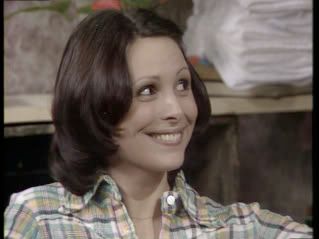
The episodes are presented in their original broadcast screen ratio of 1.33:1, and do not appear to suffer from any edits.
Audio
Sound is presented via a Dolby Digital mono track. This is clear, but there are no subtitles.
Extras
The release contains no contextual material.
Overall
Occasionally very funny, The Cuckoo Waltz is admittedly a little hit-and-miss, although it’s never less than easy viewing. Lewis Collins is perfect in the role of playboy Gavin, whilst the delectable Diane Keen was the object of many adolescent fantasies in the 1970s. Although it’s not in the top tier of 1970s British sitcoms, for fans of classic situation comedies The Cuckoo Waltz is definitely a worthwhile purchase, especially considering its absence from television screens since the mid-1980s. For more information, please visit the homepage of Network DVD.
|
|||||

|